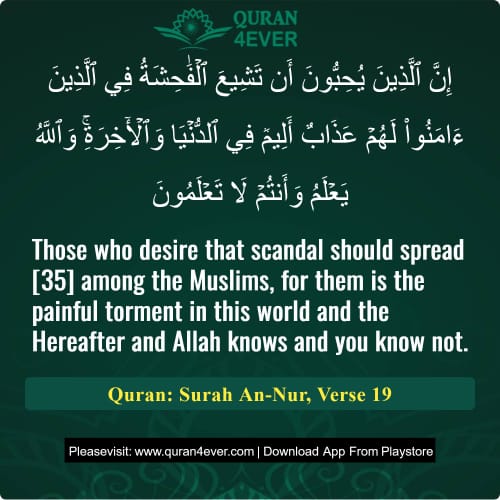
Transliteration:( Innal lazeena yuhibboona an tashee'al faahishatu fil lazeena aamanoo lahum 'azaabun aleemun fid dunyaa wal Aakhirah; wallaahu ya'lamu wa antum laa ta'lamoon )
“Those who desire that scandal should spread [35] among the Muslims, for them is the painful torment in this world and the Hereafter; and Allah knows, and you know not.”
This verse warns of painful punishment—both in this world and the Hereafter—for those who wish for scandals, immorality, or indecency to spread among the Muslim community.
It refers directly to individuals like Abdullah ibn Ubayy, the chief of the hypocrites, whose sole objective was to:
Stir conflict,
Damage reputations,
And weaken the unity of the Muslims through slander and gossip.
Even desiring the spread of shameful talk—let alone participating in it—makes one deserving of divine punishment.
The verse ends by reminding believers that Allah alone knows the hidden intentions behind people’s actions.
What may seem like casual speech or harmless talk could, in reality, stem from an intent to harm the Ummah—something only Allah truly knows, and He will judge accordingly.
19. Verily, those who like that Fahishah should be circulated among those who believe, they will have a painful torment in this world and in the Hereafter. And Allah knows and you know not.
This is a third instance of discipline directed at those who hear evil talk, believe it to some extent, and start to spread it; they should not spread such talk or pass it on to others. Allah says:
(Verily, those who like that Fahshah should be circulated among those who believe, they will have a painful torment) meaning, those who like to see evil talk about them (the believers) appear,
(they will have a painful torment in this world) means, because of the prescribed punishment, and in the Hereafter because of the torment in Hell.
(And Allah knows and you know not.) means, return the matter to Him and you will be guided. Imam Ahmad recorded from Thawban that the Prophet said:
(Do not annoy the servants of Allah, nor abuse them, nor seek their hidden shortcomings. Whoever seeks out the faults of his Muslim brother, Allah will expose his faults and degrade him, even if he is hiding in his house.)
(24:19) Verily those who love that indecency should spread among the believers deserve a painful chastisement in the world and the Hereafter.[16] Allah knows, but you do not know.[17]
16. The direct interpretation of the verse, in the context in which it occurs, is this: Those who cast aspersions, propagate evil, publicize it and bring Islamic morality into disrepute deserve punishment. The words in the text, however, comprehend all the various forms that can be employed for the propagation of evil. These include actual setting up of brothels, production of erotic stories, songs, paintings, plays and dramas as well as all kinds of mixed gatherings at clubs and hotels, which induce the people to immoralities. The Quran holds all those who resort to such things as criminals, who deserve punishment not only in the Hereafter but in this world as well. Accordingly, it is the duty of an Islamic government to put an end to all such means of propagating immorality. Its penal law must hold all those acts as cognizable offenses which the Quran mentions as crimes against public morality and declares the offenders punishable.
17. “You do not know”: You do not visualize the full impact of individual acts on society as a whole: Allah knows best the number of people who are affected by these acts and their cumulative effect on the collective life of the community. You should accordingly trust in Him and do all you can to eradicate and suppress the evils pointed out by Him. These are not trivial matters to be treated lightly; these have very serious repercussions and the offenders must be dealt with severely.
[981]- Specifically, unlawful sexual relations. [982]- The hidden aspects of all things: what is beneficial and what is harmful.

For a faster and smoother experience,
install our mobile app now.
Related Ayat(Verses)/Topics